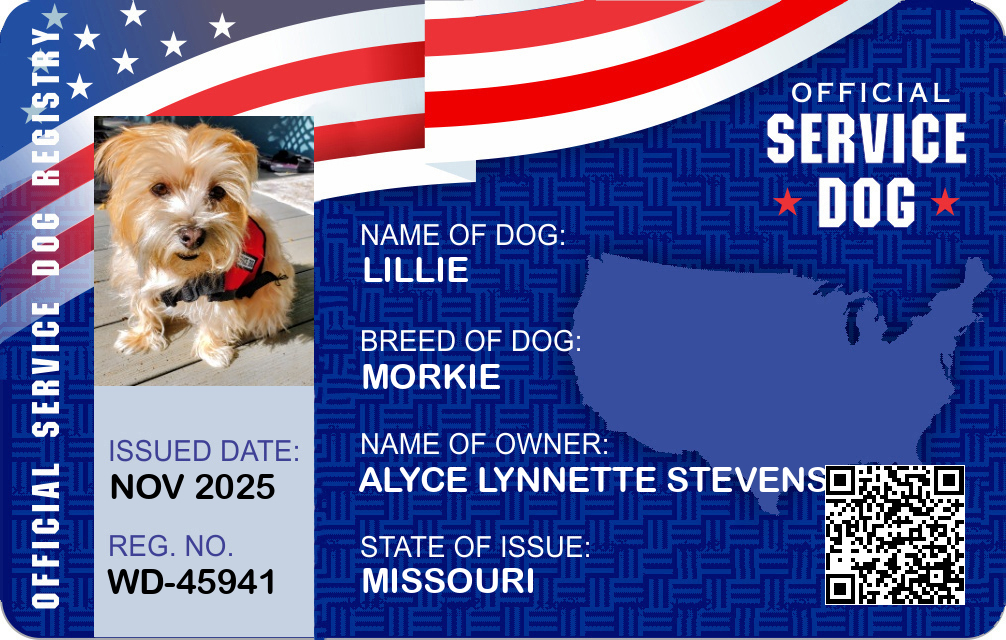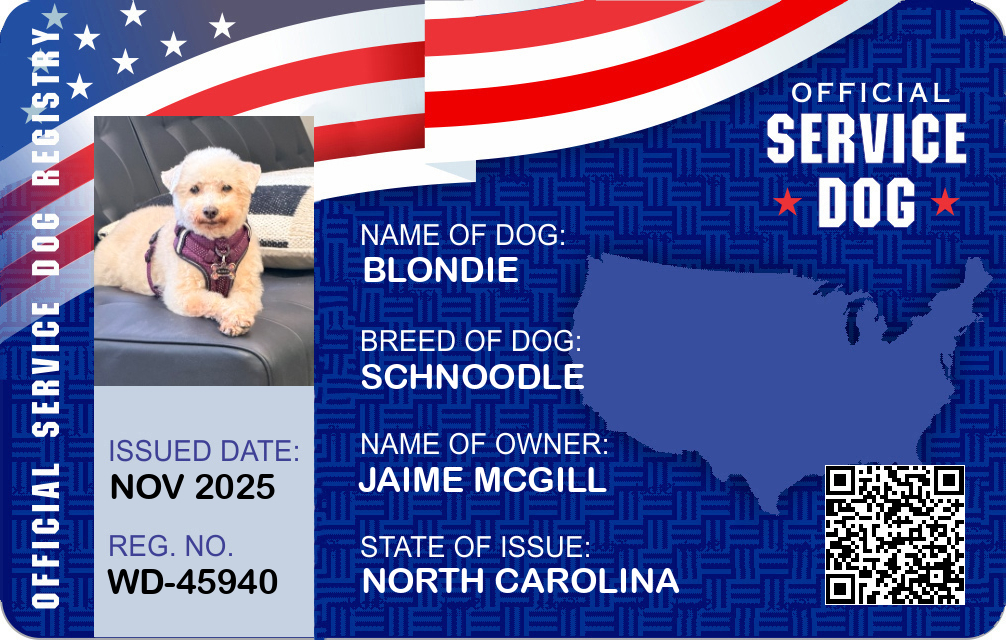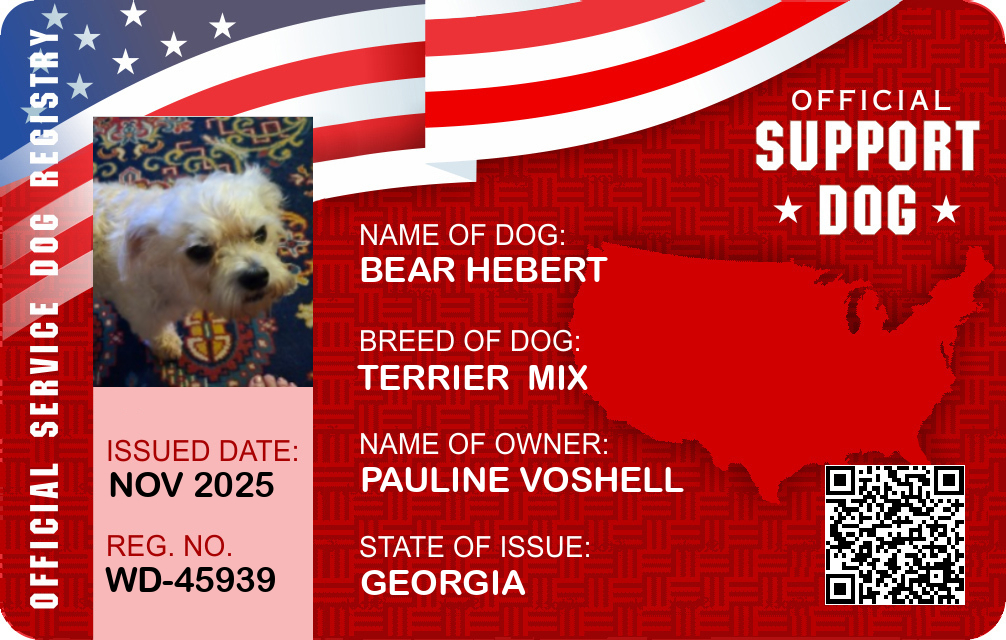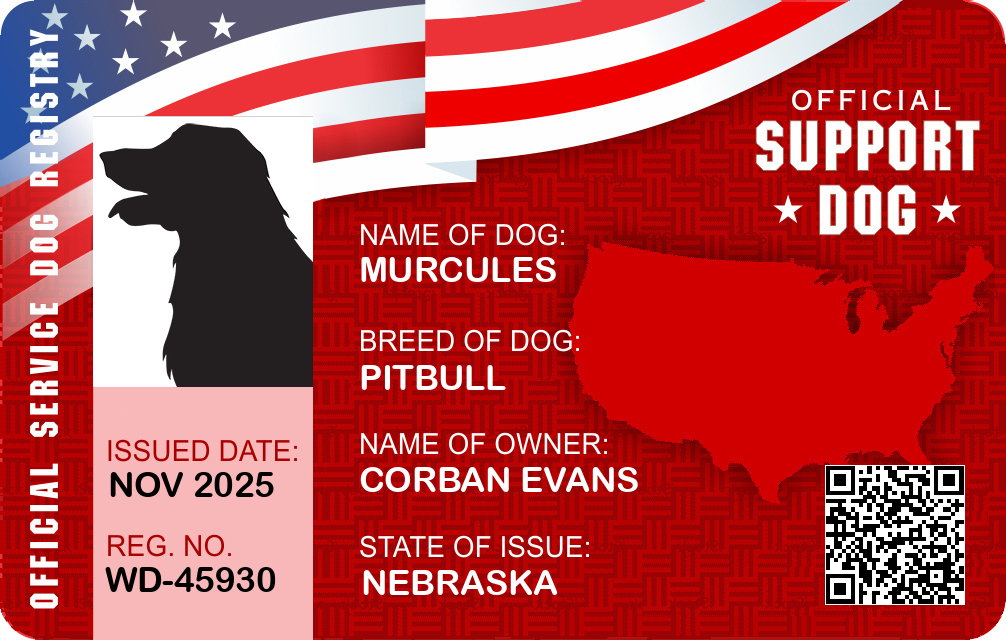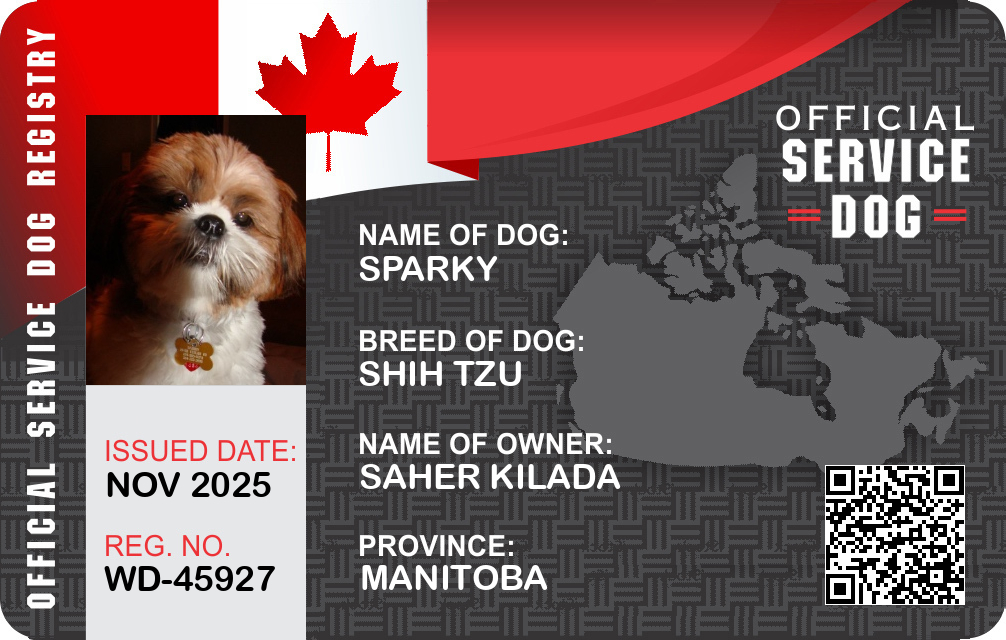District Of Columbia Service Dog Laws
Register Your Dog
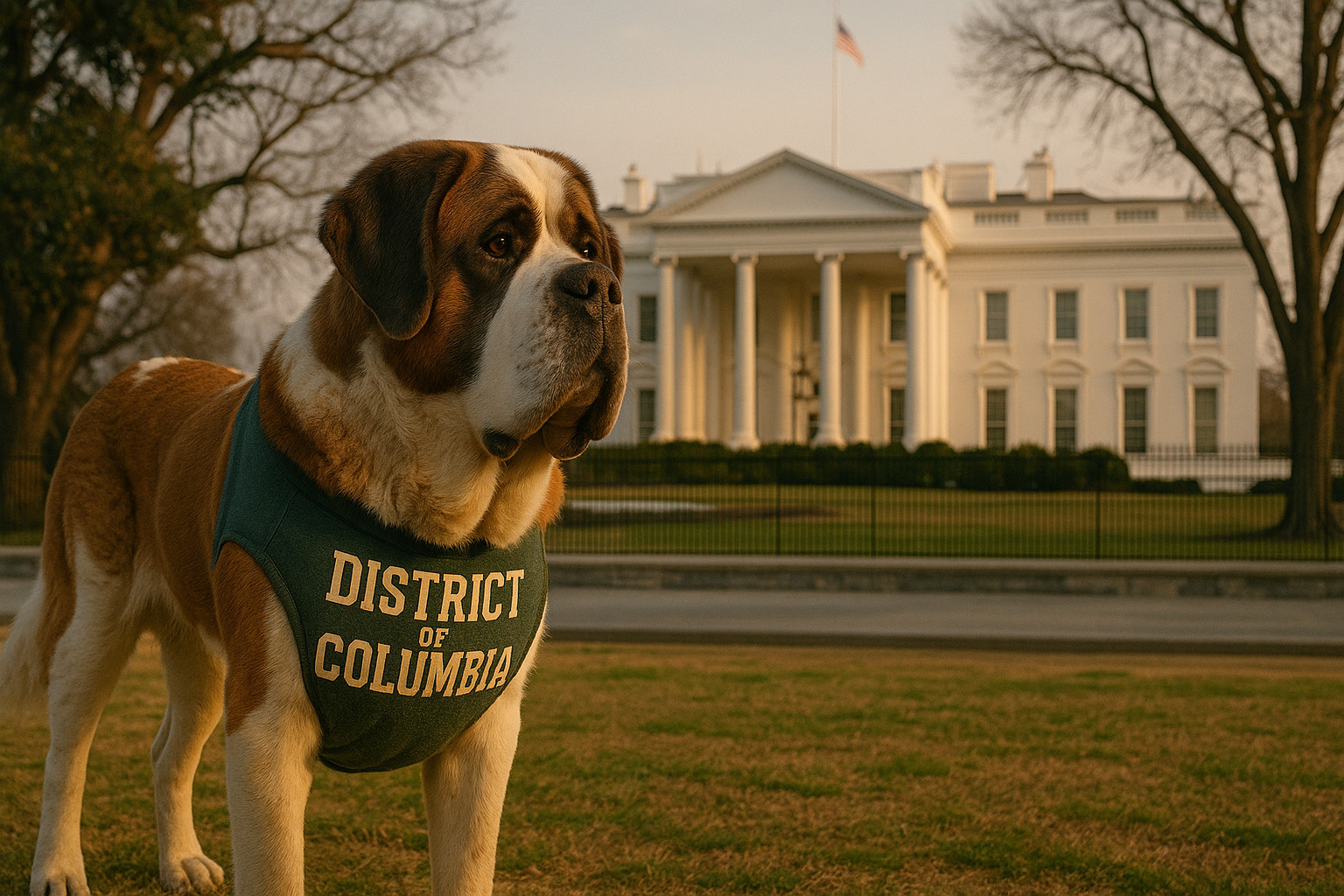
Overview of Service Dog and Legal Definitions in District Of Columbia
What is a Service Dog?
A service dog is a specially trained canine that performs tasks directly related to an individual’s disability. According to the Americans with Disabilities Act (ADA), a service dog is individually trained to do work or perform tasks for a person with a disability, which differentiates them from emotional support animals (ESAs) or therapy dogs. The work a service dog does must be directly linked to the person’s disability, such as guiding someone who is blind, alerting someone who is deaf, pulling a wheelchair, alerting and protecting a person who is having a seizure, reminding a person with mental illness to take prescribed medications, calming a person with PTSD during an anxiety attack, or performing other duties.
How Service Dogs Differ from Other Types of Assistance Animals
Service dogs differ from other assistance animals by their specialized training to undertake specific tasks for people with disabilities. Emotional Support Animals (ESAs) simply provide comfort and do not require training to perform tasks. Therapy dogs provide psychological or physiological therapy to individuals other than their owners and are typically trained to adhere to certain standards for interaction. Notably, under the ADA and corresponding local laws in the District of Columbia, only dogs (and in some cases, miniature horses) are recognized as service animals.
Key Federal Laws Affecting Service Dogs (e.g., ADA, FHA, ACAA)
Federal laws significantly influence service dog rights in the District of Columbia. The ADA ensures service dogs are allowed to accompany their handlers in public places and prohibits discrimination based on disability. The Fair Housing Act (FHA) prevents housing discrimination against individuals with disabilities, which supports the right to reasonable accommodation for service dogs in any housing situation. The Air Carrier Access Act (ACAA) similarly prohibits discrimination by airlines and allows service dogs to accompany their handlers in aircraft cabins.
State-Specific Service Dog Laws in District Of Columbia
Housing Rights and Responsibilities
Under the Fair Housing Act, individuals with disabilities in the District of Columbia are entitled to reasonable accommodation for their service dogs. This includes housing units that otherwise have a “no pets” policy. Landlords can request documentation stating the disability and the necessity of the service animal, but they cannot ask for details of the disability itself. It’s important to note that while they cannot charge additional pet fees, they may hold the service dog owner accountable for any damages caused by the animal.
Public Access and Accommodation
The District of Columbia adheres to the ADA’s provision that service dogs must be admitted in all public accommodations. This includes restaurants, hotels, retail stores, and other businesses that serve the public. Business owners in D.C. are limited in what they can ask—typically only whether the dog is a service animal required because of a disability and what tasks it has been trained to perform. They cannot demand proof of the animal’s training or ask detailed questions about the individual’s disability.
Transportation and Travel Rules
Service dogs must be admitted to all forms of public transportation in the District of Columbia, including buses, trains, and taxis, under the ADA regulations. Public transport operators can only inquire if the dog is a service animal and what tasks it performs. Under the ACAA, airlines are required to allow service dogs to accompany their handlers in the aircraft cabin without additional fees, although some documentation may be requested to verify the animal’s status.
Employment and Workplace Considerations
In accordance with the ADA, employers in the District of Columbia must provide reasonable accommodations for employees with disabilities, which includes permitting a service dog in the workplace. Employees must engage in an interactive process with their employer to determine what accommodations are necessary and reasonable for their situation. Documentation confirming the need for the service dog may be requested, but employees are not obligated to disclose their specific diagnosis.
Documentation, Requirements, and Processes in District Of Columbia
Service Dog Documentation and Who Can Issue It
While the
law does not mandate specific certification for service dogs, documentation attesting to the dog’s role can help smooth interactions with landlords and employers. Typically, a letter from a healthcare or mental health professional explaining the need for the service dog might suffice. However, it’s important to steer clear of services claiming to provide “legal certification” or “registration” as these are often unrecognized by law.Landlord, Business, and Provider Verification Rules
In the District of Columbia, parties such as landlords or business owners are limited in their verification requests. They cannot ask for specifics about the handler’s disability or require proof of the dog’s certification. Verification, if requested, must focus solely on confirming that the dog is trained to perform tasks for an individual with a disability.
Rights, Limitations, and Legal Risks
Rights Service Dog Handlers Have in District Of Columbia
Service dog handlers have the right to be accompanied by their service dogs in most public spaces, on public transportation, in housing, and in the workplace under federal and local laws. They are protected against discrimination based on their disability when accessing public services or facilities. Businesses and organizations must make reasonable accommodations for these service animals and are not permitted to charge extra fees.
Limits on Service Dog Protections and Common Restrictions
While service dogs have broad access rights, there are reasonable limitations to ensure safety and compliance. A service dog can be lawfully excluded from a premise if it is out of control and the handler does not take effective action to control it or if it is not housebroken. The law acknowledges that service dogs are working animals and not every situation is ideal for their presence, such as sterile environments or areas where their presence may fundamentally alter operations.
Penalties for Fraud or Misrepresentation
Misrepresentation of a pet as a service dog poses legal risks and is subject to penalties in the District of Columbia. While no specific state penalties are outlined currently, such fraudulent activities undermine the rights of legitimate service dog handlers and can lead to the imposition of fines or formal complaints leading to broader consequences.
Practical Guidance for Service Dog Handlers in District Of Columbia
How to Qualify for a Service Dog Legitimately
Residents seeking to qualify for a service dog must first have a documented disability and a demonstrated need for the animal to perform tasks or assist in ways specific to the disability. Consulting with a healthcare provider can be a crucial step in beginning this journey. Connecting with reputable service dog training organizations will help in ensuring the dog is adequately trained and qualified.
How to Talk to Landlords, Airlines, and Employers
When engaging with landlords, airlines, and employers, it is key to articulate clearly your rights and the function of your service dog. Using calm and fact-based discussions can aid in preventing disputes. Present any necessary documentation that outlines the need for the service dog, while being conscious of retaining privacy about your disability.
Summary of Service Dog Laws in District Of Columbia
Key rights, limitations, and practical tips for service dog handlers in the District of Columbia:
- Service dogs have broad access rights in public spaces, housing, and workplaces under federal and local laws.
- Landlords and employers may request verification of the service dog’s status, but cannot demand details about the handler’s disability.
- Misrepresentation of a pet as a service dog is subject to penalties and undermines the rights of legitimate service dog users.
- Documentation requirements typically involve a healthcare professional’s statement but avoid services offering “legal certification.”
- Interacting with landlords, employers, and public service providers should be undertaken with a focused and informed approach to your rights and their legal obligations.
By understanding and adhering to these guidelines, service dog handlers in the District of Columbia can effectively navigate the legal landscape, ensuring both compliance and the safeguarding of their rights.



